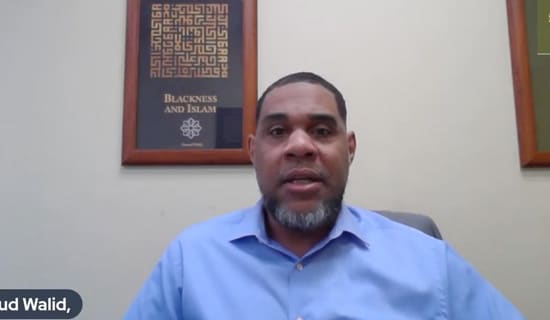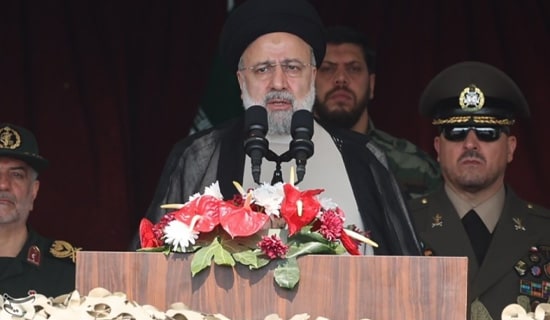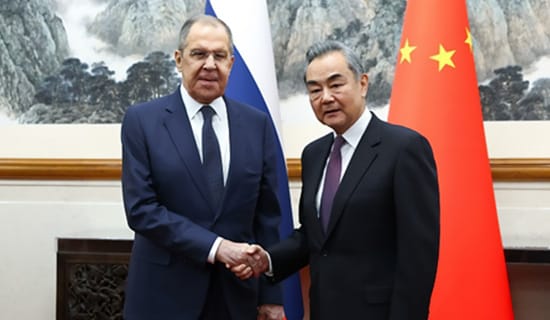Russia This Week is a weekly review by the MEMRI Russian Media Studies Project, covering the latest Russia-related news and analysis from media in Russia, the Caucasus, Central Asia, and Eastern Europe.
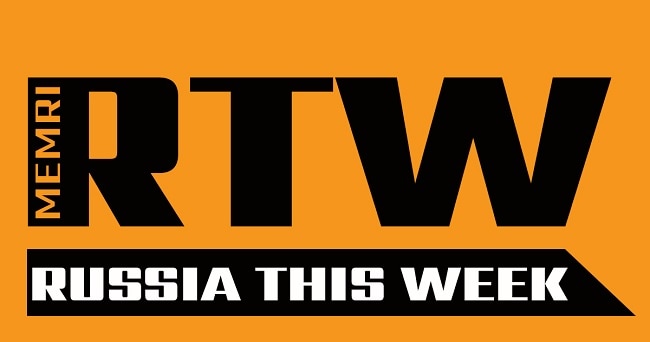
Cartoon Of The Week

Twitter.com/sharzhipero, July 11,
2016
NATO military official: Citizens of Russia, do not worry; All this is for your own security!
Zakharova Dixit
Russian Foreign Ministry spokesperson Maria Zakharova is one of the most-quoted Russian officials. She is known for using colorful language when describing Russian foreign policy in her weekly press briefings. The following are Zakharova's quotes of the week:
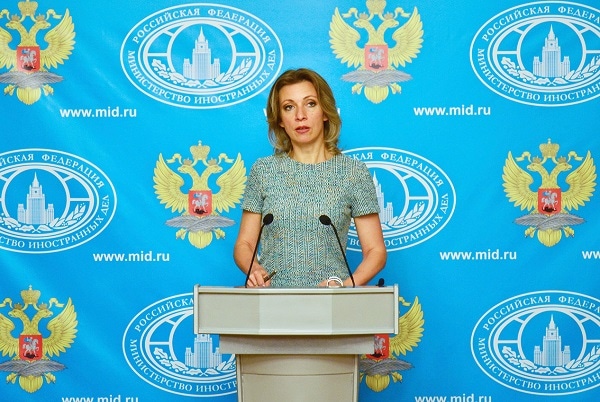
(Source:
Mid.ru, July 14)
"Not only are we aware of the reshuffle at the UK Foreign and Commonwealth Office, but Foreign Minister Sergey Lavrov has sent his congratulations to his new counterpart [Boris Johnson]. Of course, the book of Russian-British relations has been waiting a long time for someone to turn the page of bilateral cooperation, and move on from what is probably not the best chapter in its history. If Britain indicates positive hopes and intentions under the new Foreign Secretary, then we'll certainly support them. And I can also say that we will not miss Mr. Philip Hammond."
(Mid.ru, July 14)
Quote Of The Week
Mikhail Alexandrov, military expert at the Moscow-based International Relations Institute, an academic institution run by the Ministry of Foreign Affairs of Russia: "We need to quit the nuclear weapons testing moratorium, in order to demonstrate NATO that our nuclear arsenal is in an effective warfare condition."
(Pravda.ru, July 14)
In The News:
Terrorist Attack in Nice
Russian authorities condemned the terrorist attack that took place in Nice, on the Bastille Day on July 14. The Russian Foreign Ministry reports that Russian citizens are among the victims. In an address to the French nation after the attack, Russian President Vladimir Putin said: "Russia knows terrorism and the threat it creates for us all. Our people have had to deal with similar tragedies many times...I would like to emphasize again that can we can defeat terrorism only through a united effort."
(Kremlin.ru, July 15)
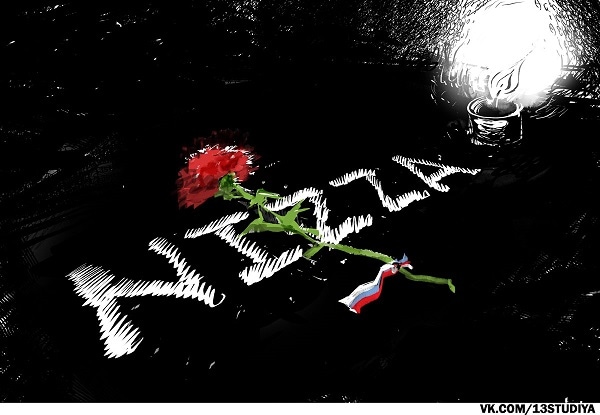
Vk.com/13studiya, July 14
"Nice"

Sharzhipero.ru, October 2015.
In October 2015, pro-Kremlin media outlet Sharzh I Pero portrayed French President François Hollande shining a terrorist's shoes.
Caption: "Everyone knows - the situation in Europe is bad, hard times are coming. Hollande will work as a servant once the war is over. The French people will serve those who they created. The ISIS masters cannot be brushed off like a fly."
NATO-Russia Council
On July 13, a NATO-Russia Council meeting took place in Brussels at the permanent representative level. For the first time since this format resumed, the meeting was attended by representatives from the Russian Defense Ministry and the alliance's military agencies.
Commenting on the NATO-Russia Council meeting during her weekly briefing, Zakharova said: "Russia unequivocally and decisively rejected the alliance's attempts to gloss over the discussion on Ukraine with political slogans and declarations...We pointed to the destructive nature of NATO's efforts to strengthen Kiev's military capability and the military exercises conducted by alliance members on Ukrainian soil."
SUPPORT OUR WORK

(Mid.ru, July 14)
(See MEMRI Special Dispatch No. 6525, Russian Government Reactions To Meeting Of NATO-Russia Council, July 14, 2016; See MEMRI No. 6522, Following The NATO Summit In Warsaw July 8-9 And Ahead Of The NATO-Russia Council Meeting On July 13 - An Interim Review, July 13, 2016; See MEMRI Special Dispatch No. 6514, NATO July 8-9 Summit In Warsaw: Russian Envoy To NATO Grushko Calls NATO 'Military Methods' An Attempt To Create New Dividing Lines In Europe, Make European Countries Dependent On The U.S., July 8, 2016; See MEMRI Special Dispatch No. 6510, One Day To The NATO Summit In Warsaw, Russian Reactions To UK Parliament's Report On British And NATO Relations With Russia, July 7, 2016; See MEMRI Special Dispatch No. 6507, Two Days To NATO's Warsaw Summit, Pro-Kremlin Think Tank Valdai Club's Expert Warns: 'Western Support... To Anti-Russian Political Forces In Belarus, Armenia And Azerbaijan Would Lead To New Crises Like That In Ukraine', July 6, 2016; See MEMRI Special Dispatch No. 6505, Three Days Before NATO's Warsaw Summit, Russian Envoy To NATO Grushko: NATO Transformed 'Central And Eastern Europe Into An Arena Of Military Confrontation', July 5, 2016; See MEMRI Special Dispatch No. 6503, Four Days To NATO's Warsaw Summit, Putin Tells Meeting Of Russian Diplomats: 'Today, NATO Seems To Be Making A Show Of Its Anti-Russian Stance', July 4, 2016)
Russia-Italy Relations
The Regional Councils of three Italian Regions, Veneto, Liguria and Lombardy have passed resolutions supporting the recognition of Crimea as an integral part of the Russian Federation. They also demand the immediate lifting of sanctions against Russia. These resolutions, supported by the Italian Euroskeptic party Lega Nord and center-right parties, will have no immediate practical consequences, as regions have no legal say on the country's foreign policy. However they constitute a symbolic political act that will pressure the central government to soften the hard stance adopted by the European Union and the United States with regards to Russia's annexation of Crimea.
Veneto was the first region to pass this resolution on May 18. Veneto Regional Counselor Stefano Valdegamberi, who sponsored the initiative in Veneto, explained the motivations:
"We want to unequivocally recognize the right of the people of Crimea to decide on their own destiny, since the people of Crimea want to stay with Russia, and we also want our relations with Russia to be restored. Obviously, this has no [immediate] consequences on foreign policy; however it conveys a wish, since Veneto is suffering as a result of wrong European policies." The resolution enjoins the region's president to open a dialogue with the central Italian authorities and with the European Union in order to revise European policies towards Russia."
On June 7, Liguria passed its own resolution whereas Lombardy followed suit on July 5. The resolution presented by the Lombardy Region in particular emphasized the necessity of Russian partnership in the fight against international terrorism and the need to offset the damages sustained by Italy due to the anti-Russian sanctions. Italy, as a whole, sustained damages of 3.6 billion Euros, while the country's industrial powerhouse of Lombardy alone bore 1.8 billion Euros in damages.
(Ilgiornale.it, May 18; Genova24.it, June 29; Ilgiorno.it, July 5)

Vitaly Podvitsky,
Vk.com/13studiya, June 29, 2016.
Russia-Montenegro Relations
In an interview with the media outlet EUobserver.com, Montenegro's prime minister, Milo Dukanovic, said that Russia is working with "strongholds" of anti-EU and anti-NATO sentiment in the Western Balkans in order to compete for influence. Dukanovic said: "They [the Russians] have their strongholds, the role of which is to oppose NATO and the EU, not only in our country, but in all the countries of the region." He then added: "It is clear Russia is very supportive and provides the logistics for certain political parties, NGOs, and media outlets which are trying to hamper Montenegro's path to Euro-Atlantic integration", he said. It should also be noted, that Montenegro, in an observer status, participated for the first time at a NATO summit. The Balkan country was invited to become NATO's 29th member in December 2015, and subsequently the Accession Protocol was signed in May 2016. Montenegro now enjoys invitee status and is integrating into NATO activities.
During her weekly briefieng, Zakharova said: "We have taken note of Prime Minister Dukanovic's statements...It can be seen that even before Montenegro was dragged into the alliance, the prime minister of that country rolled over for the leaders of this organization one more time... We can see that Mr. Dukanovic is openly and unequivocally exercising a policy of intentional damage to the traditionally friendly relations between Montenegro and Russia...Responsibility for the consequences of Podgorica's anti-Russian line lies fully and completely with Montenegro's current officials."
(Euobserver.com, July 12, 2016; Mid.ru, July 14; See MEMRI Special Dispatch No. 6443, Russian Reactions To Negotiations On Montenegro's NATO Membership, May 20, 2016)
Russia-Poland Relations
On July 12, Russia and Poland, the NATO summit's host, organized Russian-Polish consultations at a deputy foreign minister level in Moscow. Prior to the meeting, Russian First Deputy Foreign Minister Vladimir Titov stated: "Harsher anti-Russian rhetoric can be heard in statements by high-ranking Polish politicians. The 'war' on the Soviet war memorial heritage continues. Facts from our joint history are being distorted. The agreement on visa-free travel between the [Russian Baltic enclave] Kaliningrad Region and Polish regions has been suspended. We, on our part, remain open, as before, to constructive dialogue in the interests of finding reasonable solutions to the problems that have accumulated through no fault of our own."
(See MEMRI No. 6522, Following The NATO Summit In Warsaw July 8-9 And Ahead Of The NATO-Russia Council Meeting On July 13 - An Interim Review, July 13, 2016)
Ahead of the NATO Summit in Warsaw, former Polish President and Nobel peace prize laureate Lech Walesa said in an interview with RFE/RL that he would not hesitate to "knock off the wing" of Russian aircrafts if he was in charge of the US destroyer Donald Cook. Walesa said: "If I were the commander of this ship, if these [Russian] planes were flying I would shoot them. But not to kill. I would knock off the wing." Walesa referred to events happened on April 11-12, 2016, when Russia carried out a simulated attack on a U.S. guided-missile destroyer in the Baltic Sea, in which a Russian Sukhoi Su-24 attack aircraft made a low-altitude pass alongside it. The vessel, the USS Donald Cook (DDG-75), had sailed from the Polish port of Gdynia and was conducting exercises in the Baltic with its NATO ally Poland.
Commenting Walesa's statement during her weekly briefing, Zakharova said: "Sometimes I get the impression that certain politicians are in a competition to invent the craziest notions about Russia. They apparently think there'll be a prize [waiting] at the end. I simply can't comment on this because we can't keep up with this nonsense. Some people think these kinds of statements are funny. I don't think they're funny. They might be funny if they were kids or people not involved in foreign policy..."
(Rferl.org, July 1; Mid.ru, July 14; See MEMRI No. 6396, Editor-In-Chief Of Portuguese-Language Pravda Website: Kerry Is 'Pig-Faced' And 'Arrogant' To Condemn Russian Fighter Jet's Flight Over U.S. Warship In Baltic, April 20, 2016)
The Polish media reported that Poland's Lublin Archdiocese's World Youth Day (WYD) website has been recently hacked. Hackers replaced the site's content with threats in Arabic, which were displayed alongside Polish translations. The threat read, "Best to our brothers during Id Al-Fitr! Allahu akbar! The time has come to pay. All of our enemies are in one place. The NATO summit along with Warsaw will burn." According to the Polish media, hackers broke into the website of World Youth Day from a French server connected to a Russian-speaking domain registered in the United States. The Polish media outlet Cracow.today mentions that the website of a Polish defense company Mesko was also hacked. However, the website LoveKrakow.pl states that Father Adam Parszywka, head of communications for the World Youth Day organizing committee, denied that the WYD website was ever hacked.
During Zakharova's weekly briefing, a journalist said that the attack was carried out by Russian hackers and that the Polish media see this as an component of "Russia's hybrid war against the West." Zakharova answered: "You see, I am tired of commenting on this marathon of stupidity regarding an alleged Russian hybrid threat, Russia's aggression and Russian hackers who are allegedly paid to hack various sites...We believe that [allegations about Russian hackers and Russia's aggressive hybrid actions] are the information support that is provided to explain the unfriendly Western efforts to build up the military muscle and to increase its military presence on our borders..."
(Krakowpost.com, July 7; Lovekrakow.pl, July 7; Pope2016.com, July 13; Cracow.today, July 14; Mid.ru, July 14)
Russia-U.S. Relations
On July 15, U.S. Secretary of State John Kerry met with Russian President Vladimir Putin and Foreign Minister Sergey Lavrov in Moscow. The parties reportedly discussed the Syrian and Ukrainian crisis.
See Joint Press Availability With Russian Foreign Minister Sergey Lavrov
Creating Facts In The Arctic
The Russian Defense Ministry intends to build and reconstruct 10 airfields in the Arctic to strengthen Russia's presence in the northern latitudes, the daily Izvestia daily reported. Russia's Federal Agency for Special Construction (Spetsstroy) will build massive military infrastructure facilities on six Arctic islands in the Arctic taking advantage of favorable weather. This is part of an infrastructure program to accommodate more than 20,000 servicemen, their families and civilian workers at military units and garrisons in the Far North, Siberia and the Far East. In late 2015, Russia completed equipping its six military bases in the Arctic on the islands of Kotelny (New Siberian Islands), Alexandra Land (part of the Franz-Joseph Land archipelago), Sredny (Severnaya Zemlya), as well as in the Rogachevo settlement (Novaya Zemlya), on Cape Schmidt and Wrangel Island (part of the Chukotka autonomous area)
(Tass.ru/en, July 11, 2016)
The timing of the Arctic buildup is suggestive. Russia is making a push at the UN to secure recognition for its continental shelf rights in the Arctic - an enlargement of 1.2 million square kilometers and the Russian request submitted in February, 2016 will be discussed next month.
(Yamal.ru, July 9, 2016)
In an article titled "'Kamchatka Balcony' Will Stop NATO" Dmitri Evstafiev, a professor at Moscow's Higher School of Economics explains that it would be foolish to deter NATO in Europe and worry about such insignificant countries as Estonia, Lithuania, Latvia and even Poland. In Europe time is working on Russia's behalf and the only country that needs to be deterred is the US.: " Russia has a vast experience in deterring the US asymmetrically. It's enough to have a glimpse into the 1940-1970 archives, when we achieved a strategic military parity. There are many interesting ideas which are relevant even now. For instance, as a response for strengthening NATO's "eastern flank" Russia could strengthen its own eastern flank (Kamchatka) within its defense perimeter as was done in the 1940-50s. Instead of increasing confrontation around the geopolitically senseless "Baltic Balcony", we can construct a 'Kamchatka balcony', creating one more deterrence element for our Western partners. What worked then, will work now, especially when considering althered military-technical capabilities"
(Izvestia.ru, July 11, 2016)
On July 14, the Russian air force in Kamchatka region began large scale drills tasked with repelling an "enemy cruise missile attack". The crews had to detect and destroy a supersonic cruise missile launched from a nuclear-powered submarine. The military district spokesman, Colonel Alexander Gordeyev told TASS. "More than 3,000 servicemen and about 500 units of military and special equipment will be involved in the complex tactical drills at 10 ranges of the district.
(Tass.ru/en/, July 14, 2016)
Economic Tidbits
According to Echo Moscow (citing Rambler News Service ) the Russian special services electricity debt will rise to 7 billion rubles ( roughly 105 million USD) - this represents the combined debt of Ministry of Internal Affairs, the FSB and others. According to the publication the arrears accumulated because the ministries and services have exceeded their allocated budget. (Echo.msk.ru/news, July 11, 2016.)
Russia's overall budget deficit for January-June, 2016 totaled 4% of GDP which is lower than the previous finance ministry estimate but higher than the annual prognosis of 3.3%. The shortfall for half a year in constant rubles created by government spending totaled 1.5 trillion rubles.
(Ria.ru, July 13)
The anti-terror legislation recently approved by president Putin ("Yarova Law") may burden online delivery companies with roughly 2.7 billion USD in losses. According to the "Distance Trade Association" internet store purchases will drop by 30-40%. According to the legislation the postal service operators are obliged to use special hardware and software to screen all deliveries in order to discover explosives, weapons etc. Russia's Central Post Authority claims that it will cost roughly 7.5 billion USD to meet the legislation's requirements. (Echo.msk.ru, July 13, 2016.)
The signing of the anti-terror legislation has already caused one of the biggest encryption companies and internet providers - Private Internet Access - to be the first company to shut down its operations in Russia. According to the company the obligation to retain all the data for 6 month is implacable and that its services have been seized without notice and any appropriate legal procedure by the Russian authorities.
Uralvagonzavod - the manufacturer of Russia's main battle tank ( T-90 ) and future tanks ( Armata - T-14) manufacturer is pledging approximately an additional 240 million USD in funding in order to cover bank loans due for repayment in 2016-18. As of the beginning of the year, Uralvagonzavod's total debt was estimated at approximately 2.7 billion USD.
(Vedomosti.ru, July 12, 2016)
Strange But True
The anti-corruption blog of Alexey Navalny accuses vice-premier Igor Shuvalov and his wife of using a private jet for personal travels (begging the question of how Shuvalov could afford his own private jet on a government salary). Navalny admits in his publication that he does not have 100% proof that the vice-premier owns the jet. Nevertheless according to Navalny the private jet's flight logs perfectly dovetail with Shuvalov's locations and with dog exhibitions where his wife's dog competes.. The opposition politician accuses Shuvalov's wife for using a private jet for ferrying her dogs to exhibitions in Europe. According to the publication the total annual cost of this canine odyssey is roughly 600.000 USD.
(Echo.msk.ru/blog/corruption, July 14, 2016)


